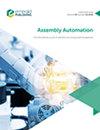A knowledge-based real-time scheduling system for steam turbine assembly under CPS environment
IF 1.7
4区 计算机科学
Q3 AUTOMATION & CONTROL SYSTEMS
引用次数: 0
Abstract
Purpose Steam turbine final assembly is a dynamic process, in which various interference events occur frequently. Currently, data transmission relies on oral presentation, while scheduling depends on the manual experience of managers. This mode has low information transmission efficiency and is difficult to timely respond to emergencies. Besides, it is difficult to consider various factors when manually adjusting the plan, which reduces assembly efficiency. The purpose of this paper is to propose a knowledge-based real-time scheduling system under cyber-physical system (CPS) environment which can improve the assembly efficiency of steam turbines. Design/methodology/approach First, an Internet of Things based CPS framework is proposed to achieve real-time monitoring of turbine assembly and improve the efficiency of information transmission. Second, a knowledge-based real-time scheduling system consisting of three modules is designed to replace manual experience for steam turbine assembly scheduling. Findings Experiments show that the scheduling results of the knowledge-based scheduling system outperform heuristic algorithms based on priority rules. Compared with manual scheduling, the delay time is reduced by 43.9%. Originality/value A knowledge-based real-time scheduling system under CPS environment is proposed to improve the assembly efficiency of steam turbines. This paper provides a reference paradigm for the application of the knowledge-based system and CPS in the assembly control of labor-intensive engineering-to-order products.CPS环境下基于知识的汽轮机装配实时调度系统
目的汽轮机总装是一个动态过程,各种干扰事件频繁发生。目前,数据传输依赖于口头陈述,而日程安排则依赖于管理人员的手动经验。这种模式信息传递效率低,难以及时应对突发事件。此外,手动调整计划时很难考虑各种因素,这降低了组装效率。本文的目的是在网络物理系统(CPS)环境下提出一种基于知识的实时调度系统,以提高汽轮机的装配效率。设计/方法论/方法首先,提出了一种基于物联网的CPS框架,以实现对涡轮机组件的实时监控,提高信息传输效率。其次,设计了一个由三个模块组成的基于知识的实时调度系统,以取代手动经验进行汽轮机装配调度。实验表明,基于知识的调度系统的调度结果优于基于优先级规则的启发式算法。与手动调度相比,延迟时间减少了43.9%。独创性/价值提出了一种基于知识的CPS环境下的实时调度系统,以提高汽轮机的装配效率。本文为知识系统和CPS在劳动密集型工程订单产品装配控制中的应用提供了一个参考范例。
本文章由计算机程序翻译,如有差异,请以英文原文为准。
求助全文
约1分钟内获得全文
求助全文
来源期刊

Assembly Automation
工程技术-工程:制造
CiteScore
4.30
自引率
14.30%
发文量
51
审稿时长
3.3 months
期刊介绍:
Assembly Automation publishes peer reviewed research articles, technology reviews and specially commissioned case studies. Each issue includes high quality content covering all aspects of assembly technology and automation, and reflecting the most interesting and strategically important research and development activities from around the world. Because of this, readers can stay at the very forefront of industry developments.
All research articles undergo rigorous double-blind peer review, and the journal’s policy of not publishing work that has only been tested in simulation means that only the very best and most practical research articles are included. This ensures that the material that is published has real relevance and value for commercial manufacturing and research organizations.
 求助内容:
求助内容: 应助结果提醒方式:
应助结果提醒方式:


